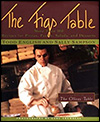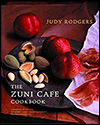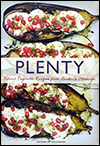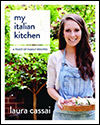 The Figs Table
The Figs Table
Todd English and Sally Sampson, 1998
When I lived in New York there was a Figs at LGA, and I ended up eating there pretty much every time I had a flight. The food was super rich, super heavy, but also very tasty: I remember that I had a “macaroni” dish that was actually orzo swimming in a wok full of melted cheese, and another time I had white chocolate challah bread pudding that probably should have been split ten ways. So on the basis of those memories I figured I’d give this cookbook a go. There were a lot of misses (risotto, polenta) but I made one dish that was absolutely fantastic: it was a white bean soup, and it taught me a couple of lessons. To wit:
- Don’t skimp on the mirepoix or sofrito or whatever the base of
your soup is.
It really does make all the difference.
- Fennel is good! This is probably my culinary conversion experience of 2017: I never liked fennel before, but it really added to the flavor of that soup, and then I tried making fennel risotto and pasta with fennel sauce and they were both winners.
So, all in all, not a cookbook I’d return to, but I got one good recipe and a new appreciation of an ingredient out of it, so a very mild thumbs‐up for this one.
 Jamie’s Italy
Jamie’s Italy
Jamie Oliver, 2006
I had heard of Jamie Oliver before watching Masterchef Australia—mainly because of his appearance in the comic strip linked over to the right there—but what prompted me check this out of the library was when he showed up on Masterchef Australia and won an antipasto challenge in impressive fashion. This cookbook turns out to be full of both winners and losers. On the negative side, the ratios in these recipes are wildly off! I followed the recipes faithfully but ended up with a soup that wound up as more of a slightly moistened pasta and with a tart whose filling was “supposed to be liquidy” but whose recipe had virtually no liquid in it. Baked ziti was a loser, lemon sorbetto was too tart, pasta alla norma had very muted flavors. But! The artichoke bruschetta recipe in this cookbook produced the best bruschetta I have ever made and possibly the best I have ever tasted; what’s more, the risotto tips were spot‐on and improved my risotto by an order of magnitude. The soups were pretty tasty too—again, it’s all about cramming as much flavor in as possible, which might mean adding pea pods to the broth as the soup is boiling, or adding so many herbs that the soup turns green. Worrrrrr indeed.
 The Zuni Cafe Cookbook
The Zuni Cafe Cookbook
Judy Rodgers, 2002
I’ve never been to the Zuni Cafe, despite my stints in the Bay Area now adding up to over seventeen years. It didn’t seem vegetarian‐friendly enough to make putting together an actual meal much of a possibility. So I thought I’d try this cookbook and just make the veggie recipes. Most of them were pretty ho‐hum, but as with the Figs cookbook, I did learn a couple of lessons:
- The onion soup with an egg cooked in it hammered home something I
should have long since figured out from the Mexican cookbook I tried
last spring and from the Korean
restaurant where I invariably get the spicy ramen soup: cooking eggs in
soup is great!
In fact, there are lots of things that you can improve just by quickly
poaching an egg and tossing it on top.
- A mortar and pestle is a worthwhile investment. I’d never used one before and didn’t realize how easy they are to use. I thought it’d be like pounding away at rocks to no avail. But no—you put the spices in the bowl, give ’em an effortless stir with the pestle, and bam, you have fresh aromatic powder.
Same verdict as the Figs cookbook, then, with the added bonus that my curiosity about the Zuni Cafe is pretty much sated.
 Plenty
Plenty
Yotam Ottolenghi, 2010
When Marco Pierre White had a falling out with the Masterchef Australia team, his annual weeklong mentorship was taken up by Yotam Ottolenghi, who initially made me go “Wait, who?” but who by the end of the week left me pretty intrigued. I’m not generally a fan of eastern Mediterranean food, but I couldn’t help but try a vegetarian cookbook which had not only received rave reviews but whose complaints read like recommendations: He’s totally concerned with flavor and doesn’t seem to care about health! This food doesn’t make me feel virtuous at all! Not everything I tried was revelatory, but when my three weeks were up, I returned this to the library and bought my own copy. Because, holy smokes, that zucchini strozzapreti was revelatory. It seems simple—pasta, zucchini, cheese, olive oil, herbs, not much else—but it’s so much more than the sum of its parts. Alchemy! And then when I found myself playing a culinary road game, making this same recipe in a kitchen where the olive oil had a hundred times the bite of mine and with no equipment to make pesto as the instructions call for, it still came out delicious—but in a totally different way. That’s where you cross the line from alchemy into magic. So, yeah, I now own this cookbook, but have not returned to it yet, so at the moment while I know this will eventually get a good grade I don’t know whether that’ll be a 10 or a 20. Stay tuned.
 My Italian Kitchen
My Italian Kitchen
Laura Cassai, 2015
Here’s another cookbook I own, because it’s from Australia and unavailable in American libraries. I was willing to purchase it without a trial run because, hey, it’s Lozzledog’s cookbook! My chance to try the food of the Masterchef Australia contestant whose food I most wanted to try! But so many of the recipes are just a matter of showcasing some obscure ingredient. Try making bruschetta with buffalo curd from your local Sri Lankan grocery! Try making pasta with wild fronds foraged on the Fleurieu Peninsula! The secret to great gnocchi? Use these potatoes you can’t get in the Northern Hemisphere! Sigh. Even the recipes that could be made with ingredients I could actually obtain tended to be unclear, and ranged from unsuccessful to “good, but nothing more than the sum of their parts”. I guess I will never know what all those judges were raving about back in 2014. Oh well. Maybe Non‐Scottish Fiona’s desserts will turn out better.



